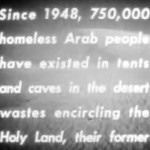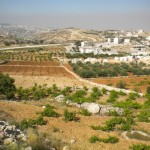
Watch Sands of Sorrow, a 1950 video about Palestinian refugees created by the Council for Relief of Palestine Arab Refugees, to see footage of Palestinian refugees soon after the 1948 mass evacuation of Palestinians from their homeland.
Life in the West Bank

BY: Mkhaimar Abusada for Bitter Lemons
The Arab Peace Initiative, which was adopted by the Arab League at its summit meeting in Beirut in 2002, is a comprehensive peace initiative first proposed by then-Crown Prince Abdullah of Saudi Arabia, and re-endorsed at the Riyadh summit in 2007. The initiative attempts to end the Arab-Israel conflict, which means normalizing relations between the entire Arab region and Israel in exchange for a complete Israeli withdrawal from all Arab territories occupied in June 1967 and a “just solution” of the Palestinian refugee problem based on UN Resolution 194.
One of the main elements of the Arab initiative stipulates: “The acceptance of the establishment of a sovereign independent Palestinian state on the Palestinian territories occupied since the 4th of June 1967 in the West Bank and Gaza Strip, with East Jerusalem as its capital.”
The issue of sovereignty and independence is of great interest and importance to Palestinians. They have not experienced independence or sovereignty in modern history. After World War I, Palestine fell under the British Mandate until 1948, and then Israel controlled 78 percent of mandatory Palestine. The West Bank was then annexed by Jordan, and Gaza was administered by Egypt, both until 1967. As a result of the June 1967 war, Palestinians in the West Bank and Gaza have been living under Israeli occupation.
The Oslo accords, signed in September 1993, led to the creation of the Palestinian Authority over parts of the West Bank and Gaza. They have deprived Palestinians of any elements of sovereignty or independence and kept the PA under total Israeli control. Palestinian movement from and into the PA territories is subject to Israeli approval. Commercial exports and imports are also subject to Israeli laws and regulations according to the Paris Economic Protocol.
“Sovereignty”, according to the Encyclopedia Britannica, is the quality of having supreme, independent authority over a geographic area, such as a territory. The concept has been discussed and debated throughout history, from the time of the Romans through to the present day, where the notion of globalization has motivated new debates. Although the term has changed in its definition, concept and application, the current notion of state sovereignty is often traced back to the Treaty of Westphalia (1648), which, in relation to states, codified the basic principles of territorial integrity, border inviolability and supremacy of the state. A sovereign is the supreme lawmaking authority within its jurisdiction.
Sovereignty means the right of the state of Palestine to become a full member of the United Nations General Assembly, adopt the UN charter, and conform to international law, the Universal Declaration of Human Rights and all other related UN documents. The state of Palestine will also be subject to its own constitution and legal norms.
“Sovereignty” for Palestinians means a total end to the Israeli occupation of the West Bank, Gaza Strip and East Jerusalem. It means that Palestinians alone will control their territory, air space, electromagnetic field and water within their own territory. It means the ability to enact laws and implement them over its citizens.
It also means the right of the Palestinian state to form its army and national security to defend territorial integrity and borders. It means the ability to defend the territory from outside enemies and aggression. But Palestine will not need to enter into military alliances, an act that violates the terms of peace and normalization with Israel.
Sovereign Palestine means the right to establish and conduct foreign and diplomatic relations with other countries to pursue peace and prosperity. No country can live in isolation from the community of nations. Countries cooperate in political, economic, security and cultural aspects, and Palestine shall be given the right to develop and pursue its diplomatic relations with Arab and Islamic–as well as western–countries.
It also means Palestine’s ability to administer and oversee the holy sites within its territory. Palestine is home to the three major religions, thus requiring it to respect and protect Jews, Christians and Muslims. Religious sites, especially those in East Jerusalem and Bethlehem, must be accessed by their respective observers. Palestine must establish a ministry to preach peace, tolerance and acceptance among all people.
Sovereign and independent Palestine will not live in a vacuum. It will be part of the community of nations that respects international law and human rights, and will do all it takes to pursue peace, security and prosperity in the region.
–Published 5/1/2011 © bitterlemons- api.org
Mkhaimar Abusada is a professor of political science at Al-Azhar university, Gaza.

Palestine Today: A Reality of Justice Denied
Media with Conscience
On December 24, Mondoweiss co-editor Adam Horowitz wrote:
“Israeli military kills 20-year old Gazan for herding animals too close to buffer zone.”
On December 23, Israeli forces shot and killed Salama Abu Harhish without warning while herding sheep and goats in Beit Lahya. Civilized nations don’t murder nonviolent civilians in cold blood, this time leaving a widow and day-old unnamed baby.
What “democracy” thrives on violence, spurns peace, and wages preemptive wars like Cast Lead. Besides America, only Israel, a global menace like its Washington paymaster/partner, together with Britain the real axis of evil.
Commemorating Operation Cast Lead in Gaza
The Palestine Telegraph
Gaza, (Pal Telegraph) – A demonstration commemorating the beginning of “Operation Cast Lead†was held Tuesday in the Gazan city of Beit Hanoun. Families of victims were in attendance, as were 5 International Solidarity Movement activists. Two years have passed since the Israeli attacks on Gaza, which killed over 1400 people in just 23 days. The vast majority of victims were civilians, including 350 children, according to the United Nations and other major human rights organizations.
The Local Initiative demonstration began at the railway street in Beit Hanoun, near some of the most horrendous attacks which occurred during the land, air and sea bombardment of Gaza. The group of around 40 continued into the ‘buffer zone’ to within 100m of the Israeli border, holding flags and photos of children killed two years ago. During the 23-day attack, none of Gaza’s 1.5 million inhabitants (including 800,000 children) were safe.
In Bethlehem, shepherds watching their flocks by night are a dying breed
The Guardian
If an “angel of the Lord” were to appear in the sky over Bethlehem today, there would be scarcely any shepherds keeping watch over their flocks to witness the scene.
Spending nights and days in the fields herding sheep has become an almost impossible task for the fast-diminishing community of shepherds in this biblical Palestinian town.
Jewish settlements, Israeli army checkpoints, closed military zones and the West Bank separation barrier have reduced the grazing area to such an extent that a growing number of Bethlehem shepherds have been forced to give up their traditional livelihoods. “I miss the freedom of the wilderness. Everything is different now. We can barely move,” says Adel Alsir, a 35-year-old Palestinian who herds his flock less than 100 metres from a biblical site known as the shepherds’ fields.
On Palestine, the US is a rogue state
The Guardian
On 17 December, Bolivia extended diplomatic recognition to the state of Palestine within its full pre-1967 borders (all of the Gaza Strip and the West Bank, including East Jerusalem). Coming soon after the similar recognitions by Brazil and Argentina, Bolivia’s recognition brought to 106 the number of UN member states recognising the state of Palestine, whose independence was proclaimed on 15 November, 1988.
While still under foreign belligerent occupation, the state of Palestine possesses all the customary international law criteria for sovereign statehood. No portion of its territory is recognised by any other country (other than Israel) as any other country’s sovereign territory and, indeed, Israel has only asserted sovereignty over a small portion of its territory – expanded East Jerusalem – leaving sovereignty over the rest both literally and legally uncontested.

Below is the press release provided by C-SJP, links to two videos of the mock checkpoint and links to other articles about the action.
New York, NY, November 18 – On November 18th, 2010 from 12pm to 2pm, Columbia University Students for Justice in Palestine (C-SJP)—a diverse group of students, faculty, staff, and community members—constructed a theatrical mock Israeli checkpoint at the Low Library steps at Columbia University.
Three students dressed as Israeli soldiers lined up dozens of volunteer students throughout the afternoon, blindfolded them, and forced them to sit on their knees as a symbolic gesture to portray the hardships faced by Palestinian students.
Those playing the role of the Palestinian students had tape over their mouths to reflect how Israel silences Palestinian voices by withholding their right to education.
We learned on Thursday morning that the Columbia administration alerted Zionist groups on campus 48 hours prior to our action in order for them to organize a counter demonstration.
Although Palestinian voices are loud and strong at Columbia – amplified by the opening of the Center for Palestine Studies last month – the administration remains firmly Zionist. All things considered, the action was a tremendous success!
Israel-Palestine debate hits College Walk from Columbia Daily Spectator on Vimeo.

Click here to read:
Report of the international fact-finding mission to investigate violations of international law, including international humanitarian and human rights law, resulting from the Israeli attacks on the flotilla of ships carrying humanitarian assistance.
Summary
This report was prepared by the fact-finding mission established by the Human Rights Council in resolution A/HRC/RES/14/1 of 2 June 2010 to investigate violations of international law, including international humanitarian law and human rights law, resulting from the interception by Israeli forces of the humanitarian aid flotilla bound for Gaza on 31 May 2010 during which nine people were killed and many others injured.
The report sets out background information relating to the interception of the flotilla as well as the applicable international law.
The fact-finding mission conducted interviews with more than 100 witnesses in Geneva, London, Istanbul and Amman. On the basis of this testimony and other information received, the Mission was able to reconstruct a picture of the circumstances surrounding the interception on 31 May 2010 and its aftermath. The report presents a factual description of the events leading up to the interception, the interception of each of the six ships in the flotilla as well as a seventh ship subsequently intercepted on 6 June 2010, the deaths of nine passengers and wounding of many others and the detention of passengers in Israel and their deportation.
The report contains a legal analysis of facts as determined by the Mission with a view to determining whether violations of international law, including international humanitarian and human rights law, took place.
The fact-finding mission concluded that a series of violations of international law, including international humanitarian and human rights law, were committed by the Israeli forces during the interception of the flotilla and during the detention of passengers in Israel prior to deportation.